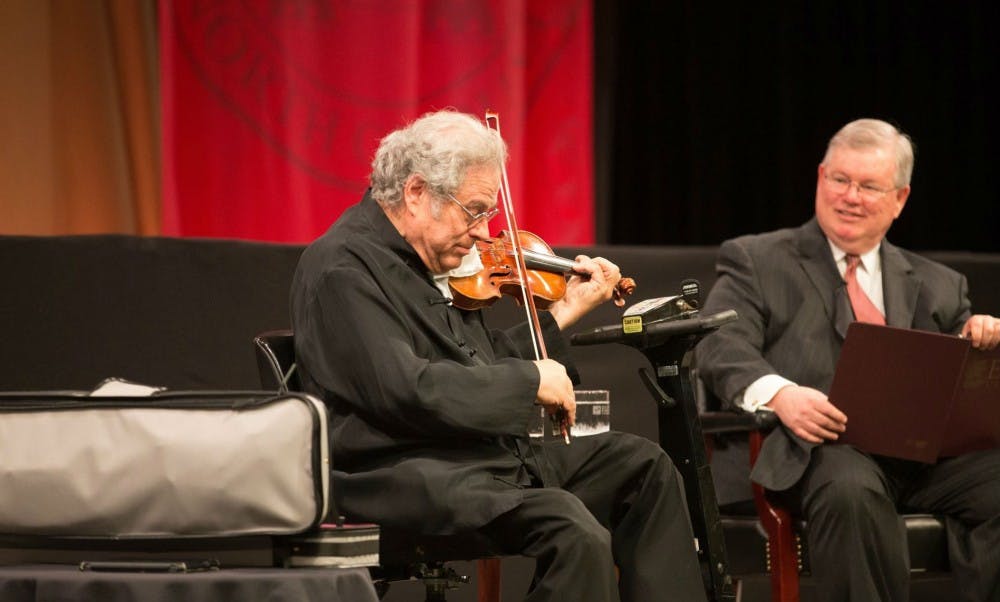The first time Itzhak Perlman played his idol Yehudi Menuhin’s violin, he knew he had found the one.
“I played a couple of notes on that violin and said to myself, ‘I’ve died and gone to heaven,’” Perlman said to a packed Alumni Gym Tuesday afternoon, the guest of honor at Elon University’s Fall Convocation.
Two weeks later, as the young Perlman negotiated a home purchase, he received an unexpected phone call with news most-welcome: the out-of-reach violin of his dreams was for sale. And he was in no position to afford it.
“It came available right when we didn’t have enough money,” Perlman said. “But we made another loan because I said, ‘Even if I don’t play a note on it, it’s worth the money just to look at.’”
Perlman, now 70, is one of the world’s best classical musicians. He’s played concert halls the world over, and he performed at President Barack Obama’s first Inauguration in 2009.
The violin, Perlman’s prized possession, is far older than he, crafted in 1714. He used it play a piece composed by Bach. As a child, Perlman learned the same rendition as he played an advertisement for a cookie manufacturing company.
“Hopefully, I can play it as well as when I was a child,” Perlman said.
And for more than four minutes, he played.
Besides the sound of people rummaging in their bags to record the music with their phones, one could hear a pin drop.
“Can you do that some more?” asked Gerald Whittington, moderator and vice president for business, finance and technology.
“It’s just one time that works,”Perlman said. “The other time, who knows?”
Thrice more, the violin emerged and silenced the audience with a crescendo of notes plucked fast and slow — including the famous score John Williams wrote for the Oscar-winning “Schindler’s List.”
Perlman took to a combination of wit and humor to keep the audience on its toes, often at Whittington’s expense. As soon as Perlman arrived on stage, he corrected Whittington that he had won 17 Grammy Awards, not the 16 Whittington mentioned in his opening.
It wouldn’t be the first snappy retort.
“I believe you were on the ‘Ed Sullivan Show’ three times,” Whittington said.
“Six,” Perlman said.
“And I count for a living,” Whittington said.
Spending long hours perfecting his trade, Perlman has developed a practice regimen all his own. Perlman explained that musicians should only practice for five hours, tops.
Any more, he said, would be like putting a sponge in water and adding a few drops — useless.
“A lot of things about practicing have to do with repetition,” Perlman said. “Muscle memory.”
Perlman, currently on a worldwide tour, will perform more than 50 times between now and May. Since the summer of 1995, Perlman and his wife have owned and operated a summer camp, The Perlman Music Program, for young, aspiring musicians.
“My goal is to continue to enjoy what I do and not to be bored,” Perlman said. “Con- ducting and teaching and playing. Each one of those things helps each other. When I teach others, I teach myself.”
NOTE: The print version of this story included a number of errors that have been fixed online. It said Perlman and Steven Spielberg wrote the score for "Schindler's List," which was written by John Williams and performed by Perlman. The quote, "And I count for a living," was incorrectly attributed to Perlman when it should've been attributed to Whittington. The piece also said Perlman has played in opera halls — he plays in concert halls — and that his violin was crafted to play a piece composed by Bach — it wasn't. The Pendulum regrets the errors.


